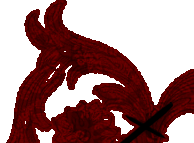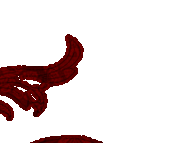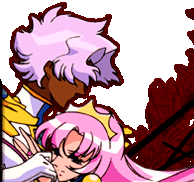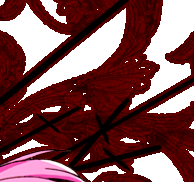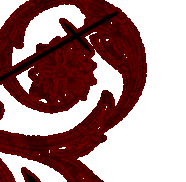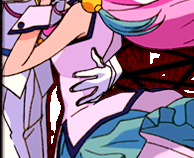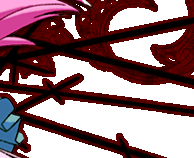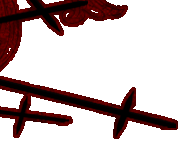
"There
is no great genius without some touch of madness." ~Seneca
History and anecdotal evidence have proved this true time and again, so it's no surprise that such a subject would be put under the Utena microscope. Ohtori's own geniuses, Miki and Mikage, are surprisingly faithful renditions of the archetype. Genius does sometimes bring with it eccentricity, psychological issues, or downright insanity, though no doubt most geniuses are comparatively normal people. Revolutionary Girl Utena is not, however, a show about those people.
The psychological troubles suffered by such individuals often find their root at the developmental years. Geniuses who discover their endowment later in life are lucky, and very rare; most find themselves exceptional early in life, when they're most vulnerable and likely to suffer for it. Young geniuses face the influence of their family and the influence of their peers, and Miki and Mikage are no different.
Geniuses often
find the first enemy right at home. Parents are inclined to live vicariously
through their extraordinary children and will push a child more than
is really safe for their mental stability. Pressure to succeed does
lead to achievement at an early age; things like Miki's writing 'The
Sunlit Garden' represent the ultimate goal of the parent looking to
show off their child. While this is undoubtedly something to be proud
of, it becomes a problem of topping yourself. The child will often
have an amazing career of achievement early on, only to find a steep
drop-off in accomplishment as time goes by. People lose interest in
genius when it stops being cute, and most of the children who started
out shining fizzle out by their teenage years. Miki seems to be one
of these children. His parents obviously decided that sending him
onto the stage was an excellent idea, and while he (as most children
do) liked the idea at the time, we see he's not continued into a blazing
pianist career. He wrote this popular song, and everyone knows it,
yet as best you can tell Miki hasn't officially released any new work
since then. At the very least, his relationship with his parents is
totally ruined. In the Akio Arc, a lot of Miki's drive to duel stems
from his lack of trust in the goals and intentions of adults. It can
be assumed Miki experienced some pressure on part of his parents to
succeed early in life for their benefit. While he's hardly crashed
into obscurity, Miki hasn't kept up with the pace he set earlier in
life. Since then, a considerable rift has driven Miki and his parents
apart, and he seems to be much less driven to achieve without them.
Mikage is a
victim of the social dilemma. Simply put, people don't 'get' him.
Though most are intimidated by intellect like Mikage's, his social
life suffers much more from his introverted personality. Looking back
to his days as Nemuro, it's easy to see where this comes from. People
just didn't like him. Nemuro was an extreme introvert, though by the
series (and his change over to Mikage) he's improved this somewhat.
People were put off by his 'computer-like' approach to things, finding
there to be little personality under all the number-crunching. However,
it's safe to say this wasn't always so; introverts like Nemuro aren't
born, they're made. It's far from wild speculation to say Nemuro didn't
do so well as a kid. He's unquestionably a strange individual, and
back when he didn't know any better, probably weirded out a lot of
his peers just by talking—and we all know how kids are when they're
threatened. Children faced with this kind of ridicule eventually learn
to keep things to themselves. This understanding leads us to the Nemuro
we see in the flashbacks. He's withdrawn from society, and avoids
people—going so far as to miss his own victory party. His introverted
lifestyle also severely retards his ability to manage emotion. While
he's a very respectable manipulator of the feelings of others, it's
a calculation for him, and he has almost no understanding of his own
emotional state. Had he perhaps had a better understanding of basic
human interaction, most of those 100 duelists would actually have
had the opportunity to duel. We're told nothing of Mikage's parents, so there's nothing to speculate on concerning that. Considering the nature of Revolutionary Girl Utena, it's unlikely his parents play a seminal role in his mentality if they were excluded. On the flip-side, Miki's extraordinarily lucky in that Mikage's issues as Nemuro are almost entirely absent for him. Miki does very well for himself in a social sense; the students of Ohtori Academy seem to have a much greater respect for intellect than most students do, and he's in an environment where he's largely accepted and liked.
In these problems, Miki and Mikage speak for a large number of geniuses, but these factors alone rarely create geniuses as mentally disturbed as they are. So far I've been contrasting them—Miki experiences one dilemma and Mikage another, but what pushes them both over the edge is also what they have in common: issues concerning morality. While issues with morality can certainly be present in non-geniuses, their intellect factors largely into their perception of right and wrong.
Miki's dilemma revolves around his guilt for the things that went on with his sister in early childhood. It's apparent in the show that Miki and Kozue shared an incestuous, albeit totally innocent, sexual relationship early in their lives. This was basically childhood experimentation. 'I'll show you my pee-pee if you show me yours' behavior is totally normal, and that it factors so highly in Miki and Kozue's relationship is indicative of a few things that evidently tipped the scale a bit. For one, theirs was a somewhat unique situation. Most experimentation happens between friends of the same sex, being opposite sex siblings adds several dynamics that complicated the issue once they became aware of what they were doing. What was at one point just experimentation becomes incest, and that it occurred between two straight people of the opposite gender makes the situation harder to chalk off as just experimentation. At that point, it becomes much easier (though still wrong) to call it sexual. This is where morality and Miki's intellect comes in.
With heightened intellect comes heightened awareness and accelerated maturation. Miki's sense of morality and his tendency to place blame on himself for everything are both strong by the beginning of the series, indicating that it started developing much sooner than usual. Miki probably became sexually aware before Kozue, and put an end to their games. His awareness of sexuality doesn't seem to be quite complete, though, because he's still very innocent—as a boy of his age should be. What you end up with, then, is a boy who is aware of what's improper, but has yet to realize some things can't be blamed on anyone. In this way Miki blames himself for much more than is ever his fault. He believes what he and Kozue were doing was horribly wrong. And while it wasn't right, it wasn't wrong; Miki's guilt complex causes him to carry the blame nonetheless. This is made considerably worse by Kozue's possessiveness of him, which serves as a constant reminder that something, though he doesn't know what, went wrong back then.
The more direct example of Miki's overblown sense of responsibility is the whole story of the concert and his illness. Miki blames himself for something that was obviously not his fault. He didn't mean to get sick, but he pines over his unwarranted guilt nonetheless.
Miki's still fresh from the womb, and because of it still clings to his guilt and responsibility issues. Mikage, however, has had long years to contemplate and observe life and morality. Mikage experiences a total collapse of morality and conscience over the time he spends in Ohtori Academy. This happens long before the series, starting most obviously, with his burning the original Nemuro Memorial Hall. By the BRS, though, he's degraded into illegal sale of forged work, school politics and population manipulation, and quite possibly, homosexual pedophilia—I happen to be highly suspect of a couple scenes with him and Mamiya.
Though Mikage
is an extreme case, his moral decomposition is a result of the cynicism
and pessimism many geniuses acquire later in life. I've met virtually
no genius adults who are perky and optimistic. This tendency toward
pessimism is a result of a thousand factors that would each warrant
their own essay, but where it's relevant here is in Mikage's deconstructed
morals. With pessimism, and certainly with time spent in Ohtori, Mikage
has realized it's utterly impossible for him to survive without getting
some blood on his hands. Actually, he makes this observation long
before the series; it would have been very prevalent in his mind when
he burned the duelists. People like Mikage often feel that they *have*
to do bad things to get what they want; that's just how things are.
Genius has a way of making people selectively observant, and this
makes the world as Mikage sees it a dark place where survival is contingent
on the willingness to do the unthinkable. He doesn't see that Utena's
way is the correct one because it doesn't make any scientific or logical
sense to him; Mikage only understands the language of manipulation
and power. You can easily see the innocent child genius that Mikage once was, and you can actually observe Miki coming to the conclusion aggressive measures are the way to get what you want. This is paramount in Miki's Akio Arc duel, and though he leaves the arena still an innocent, you can observe the beginnings of his change of heart. Miki probably won't suffer the extremity of Mikage's dementia, but we can see how he's starting to see 'how things work'. Miki from the beginning of the series would never have thought it okay to try and take Anthy by force. At that point Miki still legitimized his dueling with noble reason, but by the Akio Arc, he comes face to face with the reality of what he wants, and he embraces it.
Combined, Miki and Mikage present a seemingly inevitable fate for those so-called blessed, the steady degradation from an innocent into a pessimistic manipulator. While in real life, this fate certainly isn't set in stone, it is a very common path for the genius to follow. If (unlike myself) you have no friends or relatives with which you can prove this, just look at pop culture characters. How often is the righteous hero an intellectual? How often is the villain portrayed as anything less than pure, 100% manipulative genius? Can we say Hannibal Lecter? Nay, I don't even need to leave the series for that, look at Utena vs. Akio. (Akio is not counted in this essay because we don't know if his genius was born to him or created over ages of time.) Genius is often joined by manipulation and pessimism in adults, and the best way to become a manipulative pessimist is to be the opposite in your youth. Few things are more effective at changing your path in life than having your beliefs and morals thoroughly crushed by your teen years, or being introduced into a society that leaves no room for the innocent and clean.
  |

